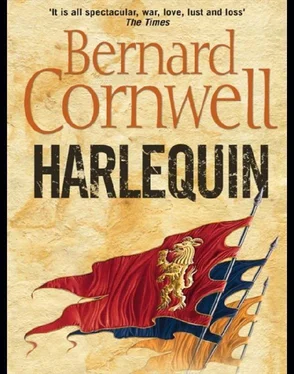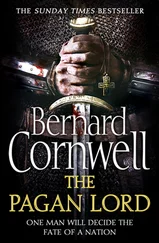What books?" Sir Guillaume asked.
Et confortabitur rex austri et de principibus eius praeva/ebit super eum," Brother Germain said softly.
Sir Guillaume looked quizzically at Thomas. And the King from the south will be mighty,“ Thomas reluctantly translated, but one of his princes will be stronger than him.”
The Cathars are of the south,“ Brother Germain said, and the prophet Daniel foresaw it all.” He raised his pigment-stained hands. The fight will be terrible, for the soul of the world is at stake, and they will use any weapon, even a woman. Filiaque regis austri veniet ad regem aquilonis facere amicitiam."
The daughter of the King of the south,“ Thomas said,'s hall come to the King of the north and make a treaty.”
Brother Germain heard the distaste in Thomas's voice. You don't believe it?“ he hissed. Why do you think we keep the scriptures from the ignorant? They contain all sorts of prophecies, young man, and each of them given direct to us by God, but such knowledge is confusing to the unlearned. Men go mad when they know too much.” He made the sign of the cross. I thank God I shall be dead soon and taken to the bliss above while you must struggle with this darkness."
Thomas walked to the window and watched two wagons of grain being unloaded by novices. Sir Guillaume's men-at-arms were play-ing dice in the cloister. That was real, he thought, not some babbling prophet. His father had ever warned him against prophecy. It drives men's minds awry, he had said, and was that why his own mind had gone astray?
The lance,“ Thomas said, trying to cling to fact instead of fancy, was taken to England by the Vexille family. My father was one of them, but he fell out with the family and he stole the lance and hid it in his church. He was killed there, and at his death he told me it was his brother's son who did it. I think it is that man, my cousin, who called himself the Harlequin.” He turned to look at Brother Germain. My father was a Vexille, but he was no heretic. He was a sinner, yes, but he struggled against his sin, he hated his own father, and he was a loyal son of the Church.“ He was a priest,” Sir Guillaume explained to the monk. And you are his son?“ Brother Germain asked in a disapproving tone. The other monks had abandoned their tidying and were listen-ing avidly. I am a priest's son,” Thomas said, and a good Christian.“ So the family discovered where the lance was hidden,” Sir Guil-laume took up the story, and hired me to retrieve it. But forgot to pay me.
Brother Germain appeared not to have heard. He was staring at Thomas. You are English?"
The bow is mine," Thomas acknowledged.
So you are a Vexille?"
Thomas shrugged. It would seem so.
Then you are one of the dark lords,“ Brother Germain said. Thomas shook his head. I am a Christian,” he said firmly. Then you have a God-given duty," the small man said with sur-prising force, which is to finish the work that was left undone a hundred years ago. Kill them all! Kill them! And kill the woman. You hear me, boy? Kill the daughter of the King of the south before she seduces France to heresy and wickedness.
If we can even find the Vexilles,“ Sir Guillaume said dubiously, and Thomas noted the word we”. They don't display their badge. I doubt they use the name Vexille. They hide."
But they have the lance now,“ Brother Germain said, and they will use it for the first of their vengeances. They will destroy France, and in the chaos that ensues, they will attack the Church.” He moaned, as if he was in physical pain. You must take away their power, and their power is the Grail."
So it was not just the lance that Thomas must save. To Father Hobbe's charge had been added all of Christendom. He wanted to laugh. Catharism had died a hundred years before, scourged and burned and dug out of the land like couch grass grubbed from a field! Dark lords, daughters of kings and princes of darkness were figments of the troubadours, not the business of archers. Except that when he looked at Sir Guillaume he saw that the Frenchman was not mocking the task. He was staring at a crucifix hanging on the scriptorium wall and mou thing a silent prayer. God help me, Thomas thought, God help me, but I am being asked to do what all the great knights of Arthur's round table failed to do: to find the Grail. Philip of Valois, King of France, ordered every Frenchman of mili-tary age to gather at Rouen. Demands went to his vassals and appeals were carried to his allies. He had expected the walls of Caen to hold the English for weeks, but the city had fallen in a day and the panicked survivors were spreading across northern France with terrible stories of devils unleashed.
Rouen, nestled in a great loop of the Seine, filled with warriors. Thousands of Genoese crossbowmen came by galley, beaching their ships on the river's bank and thronging the city's taverns, while knights and men-at-arms arrived from Anjou and Picardy, from Alencon and Champagne, from Maine, Touraine and Berry. Every blacksmith's shop became an armoury, every house a barracks and every tavern a brothel. More men arrived, until the city could scarce contain them, and tents had to be set up in the fields south of the city. Wagons crossed the bridge, loaded with hay and newly harvested grain from the rich farmlands north of the river, while from the Seine's southern bank came rumours. The English had taken Evreux, or perhaps it was Bernay? Smoke had been seen at Lisleux, and archers were swarming through the forest of Brotonne. A nun in Louviers had a dream in which the dragon killed Saint George. King Philip ordered the woman brought to Rouen, but she had a harelip, a hunchback and a stammer, and when she was presented to the King she proved unable to recount the dream, let alone confide God's strategy to His Majesty. She just shuddered and wept and the King dismissed her angrily, but took consolation from the bishop's astrologer who said Mars was in the ascendant and that meant victory was certain.
Rumour said the English were marching on Paris, then another rumour claimed they were going south to protect their territories in Gascony. It was said that every person in Caen had died, that the castle was rubble; then a story went about that the English themselves were dying of a sickness. King Philip, ever a nervous man, became petulant, demanding news, but his advisers persuaded their irritable master that wherever the English were they must eventually starve if they were kept south of the great River Seine that twisted like a snake from Paris to the sea. Edward's men were wasting the land, so needed to keep moving if they were to find food, and if the Seine was blocked then they could not go north towards the harbours on the Channel coast where they might expect supplies from England.
They use arrows like a woman uses money,“ Charles, the Count of Alencon and the King's younger brother, advised Philip, but they cannot fetch their arrows from France. They are brought to them by sea, and the further they go from the sea, the greater their problems.” So if the English were kept south of the Seine then they must eventually fight or make an ignominious retreat to Normandy. What of Paris? Paris? What of Paris?“ the King demanded. Paris will not fall,” the Count assured his brother. The city lay north of the Seine, so the English would need to cross the river and assault the largest ramparts in Christendom, and all the while the garrison would be showering them with crossbow bolts and the missiles from the hundreds of small iron guns that had been mounted on the city walls.
Maybe they will go south?“ Philip worried. To Gascony?” If they march to Gascony,“ the Count said, then they will have no boots by the time they arrive, and their arrow store will be gone. Let us pray they do go to Gascony, but above all things pray they do not reach the Seine's northern bank.” For if the English crossed the Seine they would go to the nearest Channel port to receive reinforcements and supplies and, by now, the Count knew, the English would be needing supplies. A marching army tired itself, its men became sick and its horses lame. An army that marched too long would eventually wear out like a tired crossbow. So the French reinforced the great fortresses that guarded the Seine's crossings and where a bridge could not be guarded, such as the sixteen-arched bridge at Poissy, it was demolished. A hundred men with sledgehammers broke down the parapets and hammered the stonework of the arches into the river to leave the fifteen stumps of the broken piers studding the Seine like the stepping stones of a giant, while Poissy itself, which lay south of the Seine and was reckoned indefensible, was abandoned and its people evacuated to Paris. The wide river was being turned into an impassable barrier to trap the English in an area where their food must eventually run short. Then, when the devils were weakened, the French would punish them for the terrible damage they had wrought on France. The English were still burning towns and destroying farms so that, in those long summer days, the western and southern horizons were so smeared by smoke plumes that it seemed as if there were permanent clouds on the skylines. At night the world's edge glowed and folk fleeing the fires came to Rouen where, because so many could not be housed or fed, they were ordered across the river and away to wherever they might find shelter.
Читать дальше
Конец ознакомительного отрывка
Купить книгу












